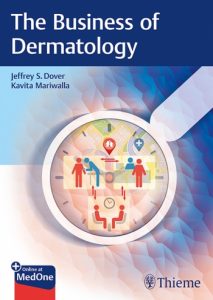EPI Health has graciously supported the COVID-19 News and Resource Center.
Refinery29 recently posted an article about COVID-19’s lasting impact on dermatology, questioning how the pandemic will affect everything from office visits to innovation to the demand for aesthetics.
For an expert opinion, I consulted dermatologist Jeffrey Dover, MD, associate clinical professor of dermatology at Yale University School of Medicine and adjunct associate professor of dermatology at Brown Medical School.  Dr. Dover, along with dermatologist Kavita Mariwalla, MD, recently wrote, “The Business of Dermatology,” a guide to managing the business aspects of a dermatology practice.
Dr. Dover, along with dermatologist Kavita Mariwalla, MD, recently wrote, “The Business of Dermatology,” a guide to managing the business aspects of a dermatology practice.
What changes have you made to your practice in light of COVID-19 that you see as becoming permanent?
Some of the new institutionalized universal precautions will be strengthened because of COVID-19 just as the HIV and AIDS epidemic changed the way we practice healthcare in America. We practice universal precautions and assume all patients are either HIV positive or hepatitis C positive or have some other potentially transmissible condition. For that reason, gloves are worn for all procedures and masks when appropriate. We might end up wearing masks, shields, and gloves for many up-close or prolonged procedures.
We have incorporated telemedicine for the first time in our practice. We believe that at least a part of our practice going forward will remain as telemedicine. For example, Accutane follow-up visits can easily be done by telemedicine to save young people from coming into the office for a monthly check at least six times during the course of treatment. This would be more efficient for the patients and for the office as it would help streamline the visits and increase access. Another example would be follow-up appointments of patients who live quite a distance from the practice.
We believe that patients will drive some of the changes post-COVID. For example, once patients have a telehealth visit for a follow-up, they might get used to it and like it better than driving a long distance, especially if they are elderly or incapacitated in any way, or live quite a distance from the practice. Procedural dermatology, however, will not be changed by telehealth. In fact, these visits must be done in person because, by nature of the visit, they require a hands-on approach.
How do you foresee COVID-19 changing the way aesthetics is practiced in the coming years?
While some aesthetic visits might be possible at least in consultation via telehealth, the procedural portion can’t ever be done at a distance and won’t be changed by the COVID-19 pandemic.
What advice do you have for graduating residents and dermatologists who are launching a practice during the pandemic?
My advice is: “Do what you do well and do it the best you can. You will succeed and do well and thrive regardless of the pandemic. While it might be a bit slower than you anticipated, and while you might see fewer patients in the first year or two than you expected, and while things might take a bit more time, they will stabilize slowly but surely. We will get over this pandemic as we have other health and public health crises in the past. Don’t rush; mistakes are hard to reverse. Do things right the first time.”
Did you enjoy this Patient Buzz expert commentary? Find more here.


